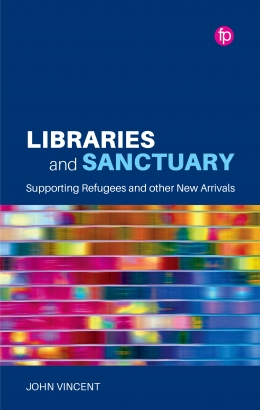
Primary tabs
You don't need to be an ALA Member to purchase from the ALA Store, but you'll be asked to create an online account/profile during checkout to proceed. This Web Account is for both Members and non-Members. Note that your ALA Member discount will be applied at the final step of the checkout process.
If you are Tax-Exempt, please verify that your account is currently set up as exempt before placing your order, as our new fulfillment center will need current documentation. Learn how to verify here.
- Description
- Table of Contents
- About the author
- Reviews
Libraries and Sanctuary is a practical guide to how libraries and their staff can support people who have crossed borders into a different country. Drawing on Vincent's decades of work in libraries and social exclusion, the book examines the different drivers behind an individual's move to another country, their need for signposting in libraries, and other barriers faced by new arrivals and people seeking sanctuary of which library workers should be aware. Readers will
- discover the background reasons for migration, the global political context of migration, and the likely impacts of both factors;
- gain an understanding of just how much work libraries have done so far;
- learn from practical initiatives, detailed through "what works" examples and longer case studies;
- identify gaps in library provision; and
- find inspiration to start similar initiatives in their own institutions.
Introduction
Definitions and scope of the book: when we talk about "refugees and other new arrivals", who exactly do we mean?
What has been the response in the UK?
What does any of this have to do with libraries?
Libraries' responses in the UK – historical background
What barriers are there to the take-up of library services by new arrivals? And how can we begin to dismantle these?
How are libraries responding today? And what more can we do? Some practical ideas …
And what can we learn from elsewhere?
Conclusions
- Appendix 1: Main countries of origin of people seeking asylum
- Appendix 2: Immigration status
- Appendix 3: A note on funding
- Appendix 4: A brief look at the supply of library materials
- Appendix 5: Outline for a course, "Working with new arrivals"
- Appendix 6: Some sources of information about new arrivals locally and regionally
- Appendix 7: Effective communications
- Appendix 8: Community cohesion
John Vincent
John Vincent has worked in the public sector since the 1960s, primarily for Hertfordshire, Lambeth, and Enfield public library services in the UK. In 1997, he was invited to become part of the team that produced the UK's first review of public libraries and social exclusion (from which CILIP’s LGBTQ+ Network, which he now coordinates, originated). He runs courses and lectures, writes, produces regular newsletters and ebulletins, and lobbies for greater awareness of the role that libraries, archives, museums, and the cultural and heritage sector play in contributing to social justice. He is particularly interested in supporting the work that libraries do with young people in care, with LGBTQ+ people, and with people seeking sanctuary and other "new arrivals" to the UK.
Have you read this book? Leave a review!
"The strength of this work stems from Vincent’s carefully developed case study narratives that situates those reading this work into grounded, real-world responses. From individual accounts of asylum, organizational responses, to wider policy documents, this book offers the reader a thoughtful exploration of previous action in a thematic way that builds up from the past, present and into future activities ... Vincent’s book has [power] as a conversation starter and foundational text to further continue moving the library and information sector to be a force of emancipation and social justice."
— Journal of Librarianship and Information Science


